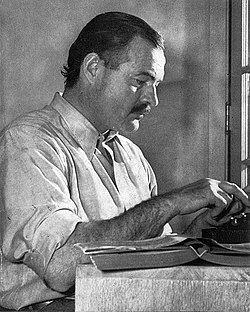Ernest Hemingway Quote
Then there is the other secret. There isn't any symbolysm [sic]. The sea is the sea. The old man is an old man. The boy is a boy and the fish is a fish. The shark are all sharks no better and no worse. All the symbolism that people say is shit. What goes beyond is what you see beyond when you know.
Ernest Hemingway
Then there is the other secret. There isn't any symbolysm [sic]. The sea is the sea. The old man is an old man. The boy is a boy and the fish is a fish. The shark are all sharks no better and no worse. All the symbolism that people say is shit. What goes beyond is what you see beyond when you know.
Tags:
symbolism, the old man and the sea
Related Quotes
It is not a person or situation that affects your life; it is the meaning you give to that person or situation, which influences your emotions and actions. Your choice is to change the meaning you gav...
Shannon L. Alder
Tags:
affect, agressive, bad perception, bad situations, change, come, competition, don t fight, don t pursue, dreams
The little boats cannot make much difference to the welfare of Gaza either way, since the materials being shipped are in such negligible quantity. The chief significance of the enterprise is therefore...
Christopher Hitchens
Tags:
activism, al qaeda, antisemitism, dictatorship, freedom flotilla ii, gaza, gaza war, genocide, hamas, hezbollah
Like symbolism, decadence puts forth the idea that the function of literature is to evoke impressions and 'correspondences', rather than to realistically depict the world. ... the decadent aestheticiz...
Asti Hustvedt
Tags:
art, bourgeois, decadence, decadent, deviant, literature decay, marginal, perversity, sickness, subversive
We write, edit, and rewrite the story of our own life employing descriptive words, metaphors, and symbols. Our lives are full of symbols including those supplied by nature and religion, which touch up...
Kilroy J. Oldster
Tags:
authors, autobiography, essay writing, expectation, expectations, hope, hopeful, idealism, idealist, idealistic
They thought more before nine a.m. than most people thought all month. I remember once declining cherry pie at dinner, and Rand cocked his head and said, 'Ahh! Iconoclast. Disdains the easy, symbolic...
Gillian Flynn
Tags:
broken home, cherry pie, childhood, childhood memories, divorce, funny, iconoclast, ironic, irony, logic
About Ernest Hemingway
Ernest Miller Hemingway ( HEM-ing-way; July 21, 1899 – July 2, 1961) was an American novelist, short-story writer and journalist. Known for an economical, understated style that influenced later 20th-century writers, he has been romanticized for his adventurous lifestyle and outspoken, blunt public image. Some of his seven novels, six short-story collections and two non-fiction works have become classics of American literature, and he was awarded the 1954 Nobel Prize in Literature.
Hemingway was raised in Oak Park, Illinois, a suburb of Chicago. After high school, he spent six months as a reporter for The Kansas City Star before enlisting in the Red Cross. He served as an ambulance driver on the Italian Front in World War I and was seriously wounded by shrapnel in 1918. In 1921, Hemingway moved to Paris, where he worked as a foreign correspondent for the Toronto Star and was influenced by the modernist writers and artists of the "Lost Generation" expatriate community. His debut novel, The Sun Also Rises, was published in 1926. In 1928, Hemingway returned to the U.S., where he settled in Key West, Florida. His experiences during the war supplied material for his 1929 novel A Farewell to Arms.
In 1937, Hemingway went to Spain to cover the Spanish Civil War, which formed the basis for his 1940 novel For Whom the Bell Tolls, written in Havana, Cuba. During World War II, Hemingway was present with Allied troops as a journalist at the Normandy landings and the liberation of Paris. In 1952, his novel The Old Man and the Sea was published to considerable acclaim, and won the Pulitzer Prize for Fiction. On a 1954 trip to Africa, Hemingway was seriously injured in two successive plane crashes, leaving him in pain and ill health for much of the rest of his life. He committed suicide at his house in Ketchum, Idaho, in 1961.
Hemingway was raised in Oak Park, Illinois, a suburb of Chicago. After high school, he spent six months as a reporter for The Kansas City Star before enlisting in the Red Cross. He served as an ambulance driver on the Italian Front in World War I and was seriously wounded by shrapnel in 1918. In 1921, Hemingway moved to Paris, where he worked as a foreign correspondent for the Toronto Star and was influenced by the modernist writers and artists of the "Lost Generation" expatriate community. His debut novel, The Sun Also Rises, was published in 1926. In 1928, Hemingway returned to the U.S., where he settled in Key West, Florida. His experiences during the war supplied material for his 1929 novel A Farewell to Arms.
In 1937, Hemingway went to Spain to cover the Spanish Civil War, which formed the basis for his 1940 novel For Whom the Bell Tolls, written in Havana, Cuba. During World War II, Hemingway was present with Allied troops as a journalist at the Normandy landings and the liberation of Paris. In 1952, his novel The Old Man and the Sea was published to considerable acclaim, and won the Pulitzer Prize for Fiction. On a 1954 trip to Africa, Hemingway was seriously injured in two successive plane crashes, leaving him in pain and ill health for much of the rest of his life. He committed suicide at his house in Ketchum, Idaho, in 1961.
